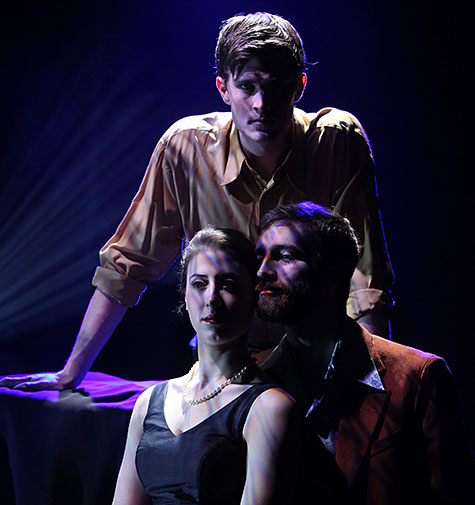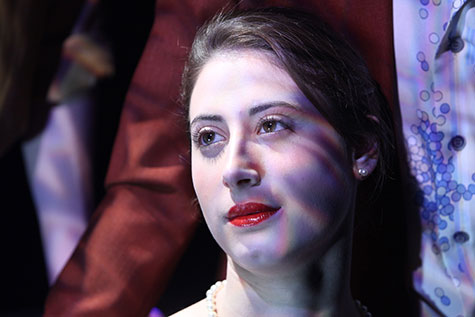
Emma sits at a corner table. Jerry arrives with wine and bitters. It’s the end of the affair and the start of the play.
In “Betrayal,” Harold Pinter traces a years-long adulterous relationship in reverse chronological order — a clever structural device, but one that begs a profound question. Knowing the height of the fall, would you still jump?
“Pinter was really quite experimental,” said Annamaria Pileggi, professor of the practice in drama. “Other than the order in which it’s told, ‘Betrayal’ is probably the most realistic of his plays. The language is sparse but loaded with subtext.
“It’s quintessentially British,” added Pileggi, who will direct “Betrayal” March 27-30 for the Performing Arts Department in Arts & Sciences at Washington University in St. Louis. “It’s brutal, but couched in civility.”

“Betrayal”
Written in 1978, “Betrayal” is loosely based on Pinter’s longtime affair with BBC reporter Joan Bakewell, who was married to Michael Bakewell, the author’s friend and head of plays for the BBC drama department.
The story centers on Emma, a gallery owner; Robert, her publisher husband; and Jerry, a literary agent who was best man at their wedding. In nine short scenes, packed into an uninterrupted 90 minutes, Pinter reverses the trajectory of the conventional morality tale, unpeeling the deceptions, disloyalties, alibis and humiliations that stem from a single, selfish moment.
Initial reviews were harsh. The Guardian’s Michael Billington decried “the pitifully thin strip of human experience it explores.” But in the years since, “Betrayal” has come to be seen as a highlight of Pinter’s Nobel Prize-winning career.
Billington himself reversed course. “Having dismissed Pinter’s play at its 1978 premiere,” he wrote in 2003, “I have spent the last quarter-century catching up with it. Each time I see it I discover something new …”
A play is really a blueprint
Pileggi, who has taught “Betrayal” in the classroom for years, notes that this is her first time directing Pinter on stage.
“It’s really not the same,” she said. “Pinter is a wonderful craftsman and wordsmith, but his work exemplifies the idea that a play is really a blueprint. It’s not a novel or poem; its not fully realized on the page. You don’t fully experience it until you see it embodied. He’s constantly shifting the earth beneath your feet.
“The actors are struggling — in a very good way — with the play’s emotional violence,” Pileggi continued. “It’s a workout, and a roller coaster. Frankly, I don’t know many college actors who could handle this material, but all three leads are exceeding my expectations. They’ve really prepared themselves.”
Indeed, given the raw subject matter, Pileggi admitted that she was surprised by how relaxed and jovial rehearsals have been.
“People are animated, joking around, having a good time,” she said. “As a director and teacher, it’s very interesting to watch how the actors take care of themselves.
“As a play, ‘Betrayal’ is much like the affair it depicts,” she concluded. “It just kind of sweeps you up, takes you away for 90 minutes, and then it’s over.”
Cast and crew
Three seniors star in the principal roles: Sarah Palay as Emma, Charles Morris as Robert and Connor McEvoy as Jerry. Sophomore Joe Holley rounds out the cast of four as a pub waiter.
Scenic and costume design are by Rob Morgan, senior lecturer in drama, and Bonnie Kruger, professor of the practice in drama, respectively. Lighting and sound are by junior David Levitt and sophomore David Ingraham.
Senior Rachel Blumer is assistant director. Junior Claire Stark is stage manager.
Tickets
“Betrayal” begins at 8 p.m. Thursday and Friday, March 27 and 28; at 2 and 8 p.m. Saturday, March 29; and at 2 p.m. Sunday, March 30. Performances take place in the A.E. Hotchner Studio Theatre, located in the Mallinckrodt Center, 6465 Forsyth Blvd.
Tickets are $15, or $10 for students, seniors and WUSTL faculty and staff, and are available through the Edison Theatre Box Office.
For more information, call 314-935-6543.